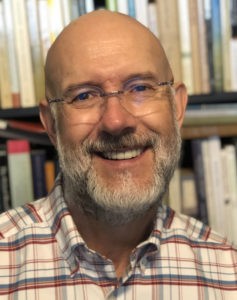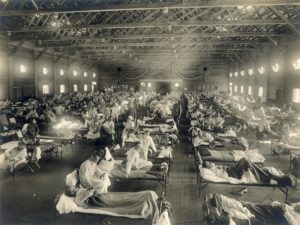I used to tell the Hardin-Simmons University students in my freshman biology class that scientific knowledge is a gift from God, but we have to do the hard work of discovering it and learning how to use it.
For example, the cancer drug Taxol was developed from chemical molecules discovered in the Pacific Yew tree from samples collected in 1962. The development of Taxol took several decades of work before it was approved by the FDA in 1994 as a treatment therapy for ovarian cancer. In addition, the development of Taxol was made possible by centuries of scientific discovery to develop basic knowledge in biological sciences, biochemistry and genetics, to name a few. The human curiosity of scientists drove this search for discovery and understanding forward after Robert Hooke first observed cells under a microscope in 1665.

Rick Hammer
God did not hand the COVID vaccines to us on a silver platter. Instead, building on several centuries of previous scientific research, researchers at the University of Pennsylvania already were at work prior to the pandemic trying to use messenger RNA (mRNA) technology to make vaccines and a variety of drugs. The science of mRNA drugs — such as the Moderna and Pfizer COVID-19 vaccines — came to fruition as the COVID-19 pandemic needed a vaccine that could be manufactured, tested for safety and effectiveness, and deployed quickly. The prior accumulation of scientific knowledge paid off.
The vaccines work
The vaccines work wonderfully. This is easy to see. Just look at the vaccination status of those who are in the nation’s ICU beds. Most of these patients are not vaccinated. There are a minor number of COVID breakthrough cases, which is to be expected with any virus and its vaccination program. The vaccines have done an effective and safe job of preventing serious illness from COVID-19.
Just in our senior population alone, a report released on Oct. 5, 2021, by the U.S. Department of Health and Human Services reported that COVID-19 vaccinations are linked to a reduction of approximately 265,000 infections, 107,000 hospitalizations and 39,000 deaths among this age group.
Science searches for understanding and truth as it explores the created world of God. All the seemingly boring and uninteresting basic knowledge about how human and animal cells work — that science has accumulated over the last 350-plus years — has given us the knowledge to develop influenza vaccines, to develop novel drugs to fight human cancers, and to improve crop plants and their yields, just to name a few benefits to society and humanity.
“Science searches for understanding and truth as it explores the created world of God.”
This accumulated knowledge was there when we needed it, and I consider it a gift from God.
Compare today to 1918
Just over a century ago, our accumulated scientific knowledge at the time was not enough to provide a medical solution to the Spanish Flu pandemic of 1918. At that time, our understanding of bacteria and viruses was minimal. Vaccine researchers of that era mistakenly thought influenza was caused by a bacterium instead of a virus as we now know. There was no influenza vaccine available in 1918. The first successful influenza vaccine was not available until 1938.

Soldiers from Fort Riley, Kansas, ill with Spanish flu at a hospital ward at Camp Funston. (Photo: Common domain)
God did not intervene and offer a global cure to stop the virus pandemic of 1918, and the people of that time were at the mercy of the few interventions and technologies — such as cloth masks — available to them to deal with the immense human suffering and death that accompanied the virus.
Our time here in 2021 is different. Since the 1918 pandemic, our scientific knowledge of living organisms at the cellular level has increased exponentially and accumulated in unimaginable ways.
Rejection of science
Enter the COVID-19 pandemic of 2020-2021 and the twisted world of science denial and vaccine misinformation. Despite advanced knowledge of vaccines, epidemiology and miraculous abilities to prevent infection and serious illness, many people in the U.S. have decided to reject the COVID-19 vaccines and the science supporting them, often based on political and religious affiliation.
The level of science literacy among the American public varies by educational level, race and ethnicity. For conservative Christians, add on to this a distrust stemming from evangelical and conservative theological positions and you have church congregations with many members who may be skeptical of the “science” and resistant to the findings and guidance that our medical establishment — and its evidence-based consensus — provides for us.
A report released in September 2021 by the Centers for Disease Control showed the benefits of vaccination for reducing hospitalizations and deaths among persons 18 years and older. The report showed — as have multiple earlier studies — that hospitalizations and deaths were substantially higher in persons who were not fully vaccinated compared to those who were.
The data are there to support the medical benefits and effectiveness of the vaccines.
Yet some Christians call into question this God-given scientific knowledge, even as they are vaccinated themselves.
Personal experience with COVID
I have encountered this skepticism and resistance in my own congregation. My church is a downtown, “heritage” Baptist church, and I would characterize our congregation as a whole as being middle of the road theologically. We have a number of outliers on both ends of the spectrum, but generally manage to be a congregation tolerant of each other’s views, at least outwardly.
“I view the vaccines and medical guidance as gifts from God, albeit hard-earned through previous decades of research in the life sciences.”
However, I have come across some recent exceptions to this. Although fully vaccinated for COVID, I came down with a breakthrough case in early September. My symptoms were relatively mild and not too difficult to endure during the course of my quarantine at home. I serve my church as a deacon and receive the daily emailed prayer list to the deacon members. I saw my name appear on the list and was appreciative of the prayers and thoughts from our deacon body and others in the congregation.
When I came out of quarantine, I asked that my name be removed from the prayer list. In return, I requested that a new prayer request be added on my behalf. I asked for prayers and acceptance for the COVID vaccines and medical guidance, and that our church membership be affected this way. I view the vaccines and medical guidance as gifts from God, albeit hard-earned through previous decades of research in the life sciences.
Regarding my request, I was told that the church leadership thought what I was asking would make some church members uncomfortable because some “did not want or believe in the vaccine.” I obviously do not know the backstory for these members, but I speculate that it has to do with political party orientation and a general distrust of scientists and medical experts or a misunderstanding of the rapid development of the COVID vaccines.
We are what I consider to be a moderate Baptist church theologically. We thankfully do not hear political exhortations and indoctrination from the pulpit. Instead, our pulpit has focused on bringing the good news of Jesus Christ and his love to a world in need. You would think from that position we would be able to pray corporately for acceptance of vaccines and policies (such as masks) that have been shown to prevent serious illness and death.
But we could not.
White evangelical Christians as outliers
I have seen a number of news pieces analyzing and reporting why most white Christian evangelicals — and sometimes openly defiant congregations — are opposed to medical guidance. Much comes down to the fact that these Christians see that God controls everything, including the pandemic, as opposed to the fact we are playing by the biological rules of COVID which, in reality, are God’s rules.
Political party affiliation undoubtedly plays a major role in vaccine acceptance or denial. I live in politically conservative Taylor County, Texas, where 72% voted for Donald Trump in the 2020 presidential election. That fact alone might explain why my county has only 39.3% of residents fully vaccinated.
“I was curious to see how my Texas county’s religious affiliation compared to the national average for additional insight into vaccine hesitancy.”
Religious affiliation seems to be correlated to whether one is likely to accept the vaccines. A recent Pew Research Center survey found that 66% of Protestants have had at least one dose of vaccine. Breaking this down further, only 57% of white evangelical Christians have had the vaccine, compared to 73% of white not evangelical believers.
Diving deeper, I was curious to see how my Texas county’s religious affiliation compared to the national average for additional insight into vaccine hesitancy. My data comes from the 2020 Census of American Religion (Public Religion Research Institute) and provides a detailed look at religious diversity at the county level in America.
As a basis of comparison, the Pew study found that white Christians made up 40% of the U.S. population in 2020. White evangelical Protestants made up 14% of the U.S. population. In my county, almost two-thirds (60%) of residents are white Christian, with white evangelical Protestants making up 37% and white mainline Protestants making up 16%. My county trends white evangelical, and our vaccination rate of 39.3% seems to reflect this religious makeup.
Vaccine hesitancy is directly associated with religious affiliation for white Protestants. Science is less important, if at all, for pandemic guidance.
What about God’s sovereignty?
In closing, I am confronted with some larger, theological and spiritual questions.
First, is “not wanting or believing in” the vaccines and discouraging others a denial of God’s sovereignty? An evangelical might interpret God’s sovereignty as controlling the day-to-day workings of the pandemic, including choosing who gets the virus and who does not. Personal and civic responsibility — such as supporting mask mandates and vaccines — are abrogated in favor of individual rights for anti-vaxxers. However, it seems that the development of life-saving vaccines and caring for those afflicted with COVID are more in harmony with the sovereignty of God.
Does denying the medical effectiveness of the vaccines amount to bearing false witness to others by spreading conspiracy theories and by denying God’s gift of scientific knowledge to care for God’s people?
“Cancer vaccines based on the mRNA technology of the COVID vaccines are in development for advanced melanoma and for a specific type of lung cancer. Will these be rejected by evangelical Christians the same as COVID vaccines?”
I have read statements from some evangelicals claiming that those who get sick are not living a holy life and are not faithful, so God cannot protect them since God does not use vaccines. I wonder if those same people also would refute and deny treatment for other life-threatening diseases such as lung cancer or heart disease.
The same mRNA genetic technologies on which the COVID vaccines are based soon will bring us new treatments — to extend life and eventually possibly cure — for hard-to-treat cancers and other human diseases for which there have been few if any treatments available. Cancer vaccines based on the mRNA technology of the COVID vaccines are in development for advanced melanoma and for a specific type of lung cancer. Will these be rejected by evangelical Christians the same as COVID vaccines? It might be a hypocritical choice, but I can’t imagine anyone or a loved one with one of these cancers refusing these treatments.
Is vaccine denial a ‘Left Behind’ mentality?
Second, are evangelical Christians’ denial and disparagement of vaccines and masks a result of theological dualism or a “Left Behind” mentality? I think this is a likely contributor. That is, by not accepting that we are connected to nature and the physical world around us for our daily survival, we must view everything in the physical world as “not of God” and as something that someday will be left behind. Viruses — at least some—are actually a good part of creation too. God’s creation needs them to keep bacterial populations in healthy check.
Vaccines can be seen as good gifts of God when we see our world from a Revelation 21-22 view that God will establish God’s future kingdom here on earth (a new Genesis). Vaccines are thus “of this world or of God’s world” and are gifts that arise from the biological knowledge gleaned from studying God’s creation.
I have a friend who is pastor of a mainline Protestant church. When I asked him about how his congregation approached the pandemic and vaccines during worship, his response was both telling and ecumenical. He said his church was comfortable in referring to the vaccines and thanks were given for the vaccines in more than one prayer during recent months.
I will pray for such ecumenical hope and understanding for America.
We need God’s COVID grace and love.
Rick Hammer is a science writer based in Abilene, Texas He has a major interest in the dialogue between faith and science and enjoys speaking to church groups about this topic. He earned a Ph.D. in botany from Texas A&M University.
Related articles:
Church ‘religious exemption’ letters against COVID vaccination mandates likely won’t work | Analysis by Mark Wingfield
Interpreting the data: Why are some Christians getting vaccinated and others aren’t?
Both Robert Jeffress and Pope Francis want you to get vaccinated


